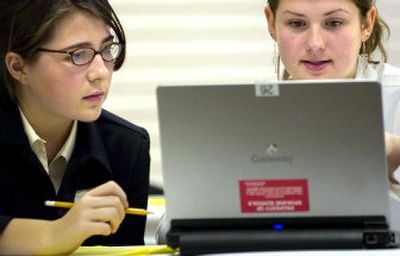All business at DECA event

For Anne Guhlke, it’s a wonder how businesswomen wear pantyhose.
“We don’t wear them on the farm,” said 15-year-old Guhlke, daughter of a “dirt farmer” and a sophomore at Davenport High School.
But on Wednesday, she donned pantyhose for the Eastern Washington regional Distributive Education Clubs of America competition at the NorthTown Mall.
This was Guhlke’s first DECA event. She hoped to learn more about business practices to help her with a side job of selling vegetables she grows on almost 3 acres of her parents’ farm.
Each year, hundreds of teens from Eastern Washington come to the mall to compete for a chance to advance to the statewide DECA competition in Seattle. DECA was formed in 1946 to help educate students in marketing and business management.
Students – some in borrowed ties and unfamiliar boardroom fashions – walked the mall in small groups between tests.
As part of the day’s competition, students took a one-hour test of their business knowledge. Then they worked on responses to business situations.
Clark Weigand, a senior at Ferris High School, showed little outward nervousness at being judged and graded. He stood against the wall listening to Matisyaho, a reggae band, on his iPod.
“I had to go find a tie from my dad,” Weigand said.
His dad – a tax attorney – tied it on himself first, then loosened it and placed it over his son’s neck.
“He said I look good,” Weigand said.
Bill Christianson, a Ferris business teacher who organizes the annual event, said most students take it very seriously.
There were circles of students dressed in suits text messaging one another on their cell phones.
Most students have ambitions for a business career, Christianson said.
DECA students at Ferris and other Spokane Public Schools may have ambitions, but they’ll have fewer opportunities to compete on a state and federal level because of changed nutrition policies, Christianson said.
Under those policies, DECA can no longer sell soda or candy – big moneymakers for the club.
Funds have dipped so much that it’s unlikely anyone will be able to attend the Washington DECA’s State Career Development Conference in Seattle, Christianson said.
There’s already an impact on involvement in DECA. Last year, 600 students attended the Eastern Washington event, and this year it was down to 420, Christianson said.
Last year, 18 Ferris students qualified for state. It would cost each student $275 to attend the Seattle state competition this year, and that doesn’t include meals, Christianson said. There’s a chance no one will go, he said.
“It’s just the beginning of what we’re going to see,” Christianson said.
Phillip Ventress, a Gonzaga University student who graduated from Ferris three years ago, is now a DECA judge.
Ventress became a regional representative and traveled to New York, Florida and New Mexico, and made numerous trips to Seattle while in high school.
“Before, we were making so much money off the candy, kids who were underprivileged had an opportunity to go on trips,” Ventress said. “A lot of things I do in my life now are because of DECA. … I wish everyone in DECA had the same experience I did.”
The thrill is still there for some, like Raven Jones, 15, a sophomore at Rogers High School.
“I was a troubled kid a few years ago,” Jones said.
Her parents are thrilled she’s now involved with DECA.
“I’m becoming the young lady they always thought I should become,” she said.